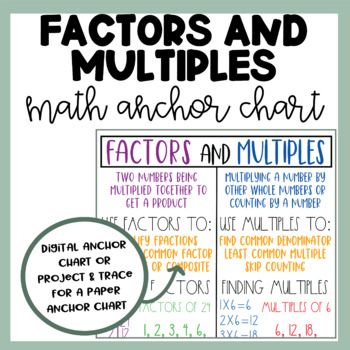An anchor chart for multiples is a visual aid that helps students understand the concept of multiples in mathematics. Multiples are the result of multiplying a number by integers. For example, multiples of 3 are 3, 6, 9, 12, and so on. By creating an anchor chart that lists multiples in an organized manner, students can easily grasp this concept and apply it to solve math problems.
When creating an anchor chart for multiples, it is important to include clear examples and explanations to help students understand the concept. Using different colors, shapes, and visual elements can make the anchor chart more engaging and memorable for students.
Anchor Chart For Multiples
Benefits of Using Anchor Charts
Anchor charts are a valuable teaching tool that can benefit students in many ways. They provide a visual reference for students to refer back to when working on math problems or studying for tests. Anchor charts can also serve as a reminder of key concepts and strategies, helping students retain information more effectively.
Additionally, anchor charts can promote student engagement and participation in the classroom. By involving students in the creation of anchor charts, teachers can encourage collaboration and critical thinking skills. This hands-on approach to learning can enhance students’ understanding of multiples and other mathematical concepts.
Conclusion
In conclusion, an anchor chart for multiples is a useful tool for teaching and reinforcing the concept of multiples in mathematics. By creating visually appealing and informative anchor charts, teachers can help students understand multiples more effectively. Incorporating anchor charts into math lessons can enhance student learning and engagement, making math more enjoyable and accessible for all students.
